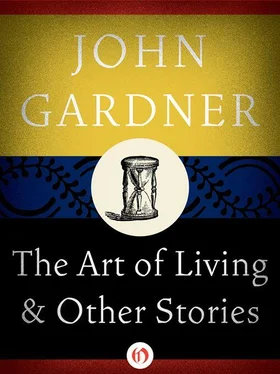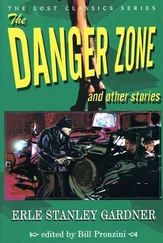“Not crazy,” he shouted, turning on me, red-faced and wide-eyed, brandishing a bottle with Chinese writing on it, shaking it at me like it was blackish holy water.
“You’re a child molester,” I shouted back.
“What?” he said, surprised.
“Well, something like that,” I said. “I forget the word. You corrupted Angelina and you corrupted us — made us perfectly good citizens steal a dog and kill it for somebody to eat, which is practically cannibalism, and yet on you babble about people accepting things, not caring about themselves, not daring to stand up!”
Arnold held out his hands, pleading for a little justice, a little common sense. “You think I condone your lawless acts?” he asked. “But at least you had a reason. You actually felt something.” He glanced at Angelina, then quickly away again. He picked up a pair of tong-like things. “You felt whatever it was that made you do it, and you felt something when you did it, I’ll bet. Felt something. Right? For a minute you existed! How do you feel about the packaged, drugged-up meat at your supermarket, or airplanes dropping bombs from so high up they don’t know there’s people down there — they never have to see it — or the Japanese and Russians out murdering the kings of the sea? Do you feel anything at all about such matters, my hot Irish friend? Not likely! Most people don’t. If you can’t feel anything about things near at hand, how can you feel for things more distant and abstract? Ponder it! Ponder it!”
“You’re nuts,” Lenny the Shadow said. It was the first I knew that he’d come back. “You shouldda been a man-eating tiger.”
“More like he shouldda been napalm,” Benny the Butcher said. “ Fssssss.! ”
“ Not nuts!” Arnold yelled, whirling and pointing at Lenny with the tongs. “Similar but different! I got centuries of tradition controlling my craziness. I got ideals, I got standards!”
He didn’t seem to notice that the old man, Frank, the owner, was in the doorway, shrunken, morose, leaning hard on two canes. The bags under his eyes were like toadskin. The eyes, above the bags and under the gray eyebrows, were filmy. Joe stood a little behind him, in the shadows.
Arnold was raving, “I’m an artist, you understand that? What’s an artist? How’s he different from an ordinary nut? An artist is a man who makes a covenant with tradition. Not just dreams, grand hopes and abstractions — no, hell no — a covenant with something that’s there , pots and paintings, recipes: the specific that makes things indefinite come alive — assuming you don’t get lost in ’em, the specifics, I mean. Salt, for instance. A man can get lost in the idea of salt — too much, too little, what the ancients thought of it, whether you should shake it with the left hand or the right — No! That’s not art! Dead art! Cancel! ” He gasped, jumped in again, swinging his left arm in front of him as if driving back hordes. “The artist’s contract is, come hell or high water he won’t go cheap, he’ll never quit trying for the best. Maybe he fails, maybe he sells out and hates himself. You know it can happen just like you know you can stop loving your wife, but all the same you make the promise. Otherwise you have to go with ordinary craziness, which is disgusting.” He spit. Forgot himself and spit right on the floor.
Then he turned with a flourish, reached into the pot two-handed with the tongs, and raised up the dog to look at it. He was bent forward like a wrestler, his expression fierce, arm and shoulder muscles swollen. Whether he was pleased or disappointed we couldn’t tell. He swung around and held the carcass toward us, high, dripping pink water — raised it and held it up like some old-time sacrifice the gods were supposed to come sniff.
In the doorway old Frank Dellapicallo said, gravel-voiced, black as doom, “If you cooked that thing you better serve it, mister.”
Arnold swung his head around to look at him. Automatically he lowered the dog into the pot. “What’s that?”
“You heard me,” Frank growled. “If that’s your chef’s special, you better find customers to feed it to.”
“I’ll eat it, don’t worry,” Arnold said.
“Not you,” Frank said. “ People . Otherwise”—he jerked one cane toward the hallway behind him—“out!”
Joe came into the light now, arms folded, white sleeves sharply outlined over the black of his vest. He was grinning. You couldn’t really blame him, even though Arnold had been more or less a friend. There were blood marks all over the floor, though not as bad as earlier. Ellis had mopped some of it up. Angelina was leaning forward, stretching out her arms toward the old man, whining at him, “ Gram -pa …”
“Shut up,” Frank said — just like that, exactly as you’d speak to a three-year-old child, or a dog. “He knows the agreement.”
Mechanically, because it was time, according to the recipe in the book, Arnold took the dog out of the pot and laid it in the pan where Ellis had put the fruit and things, arranged it so the pawless feet were tucked under the body and the black cap of hair on the tail could be seen, then carried the whole thing to the oven. Ellis held open the oven door for him while he slid in the pan.
Then everybody just stood there. Arnold poured himself more whiskey.
“Well,” Arnold said, squinting his little pig-eyes and rubbing his hands on his apron, “there’s a lesson in this.” He didn’t go on. According to the clock over the counter it was 3 a.m.
Just then a knock came at the kitchen’s back door. We all jumped, and then after a minute Benny went over and opened the door a few inches to look out. He opened the door wider. Arnold’s three daughters stood there, homely and scared-looking, their skin the color of old ashes. The oldest one was eighteen, though she looked more like fourteen or fifteen. The youngest was ten. I knew her a little; she was in my sister Shannon’s class at school. All three of them looked like orphans — little glasses like Arnold’s and washed-out hand-me-down clothes — but if they looked pitiful it was mostly just the hour and their shyness, maybe a fear, not fully admitted, that their father had had some accident, or had shot himself. They came in sideways, like refugees, looking at Arnold and saying nothing, their expressions meek, timidly friendly, as if they were hoping no one would yell at them. I was aware again of the room’s thick blood smell. Arnold stared at the three girls, saying nothing, no doubt trying to figure out how he felt. At last he gave an abrupt nod, freeing them to smile and shyly nod back — they stretched out the nod to make it do for all of us — then they faded as well as they could into the walls.
Arnold began cleaning things up, putting condiments and spices away, carrying knives and pots and pans over to the sink, throwing out his waste. Angelina moved over closer to her grandfather, probably so that when she spoke Arnold’s daughters wouldn’t hear her.
“How can you fire him, Grandpa?” she asked. “He made us famous .”
She knew well enough why Frank could fire him. He’d challenged Joe; he’d made us steal the dog; he was crazy.
But the old man was too tired and impatient for the complicated reasons. “We had an agreement.”
We stood and waited. A strange, mysteriously sweet smell began to fill the kitchen. Tony Petrillo opened a bottle of wine from the bar, just walked in and got it. Awkwardly, spilling a little, he poured a glass for Arnold, leaning on the counter, standing with his feet crossed, big bags under his eyes. Arnold accepted the wine without even noticing, though he had whiskey in the other hand. Tony poured another glass of wine for Angelina, then one for me, one for Benny, one for Lenny, and one for each of the girls. When he held a glass up for Frank, the old man waved him away in disgust. He didn’t offer one to Joe.
Читать дальше












